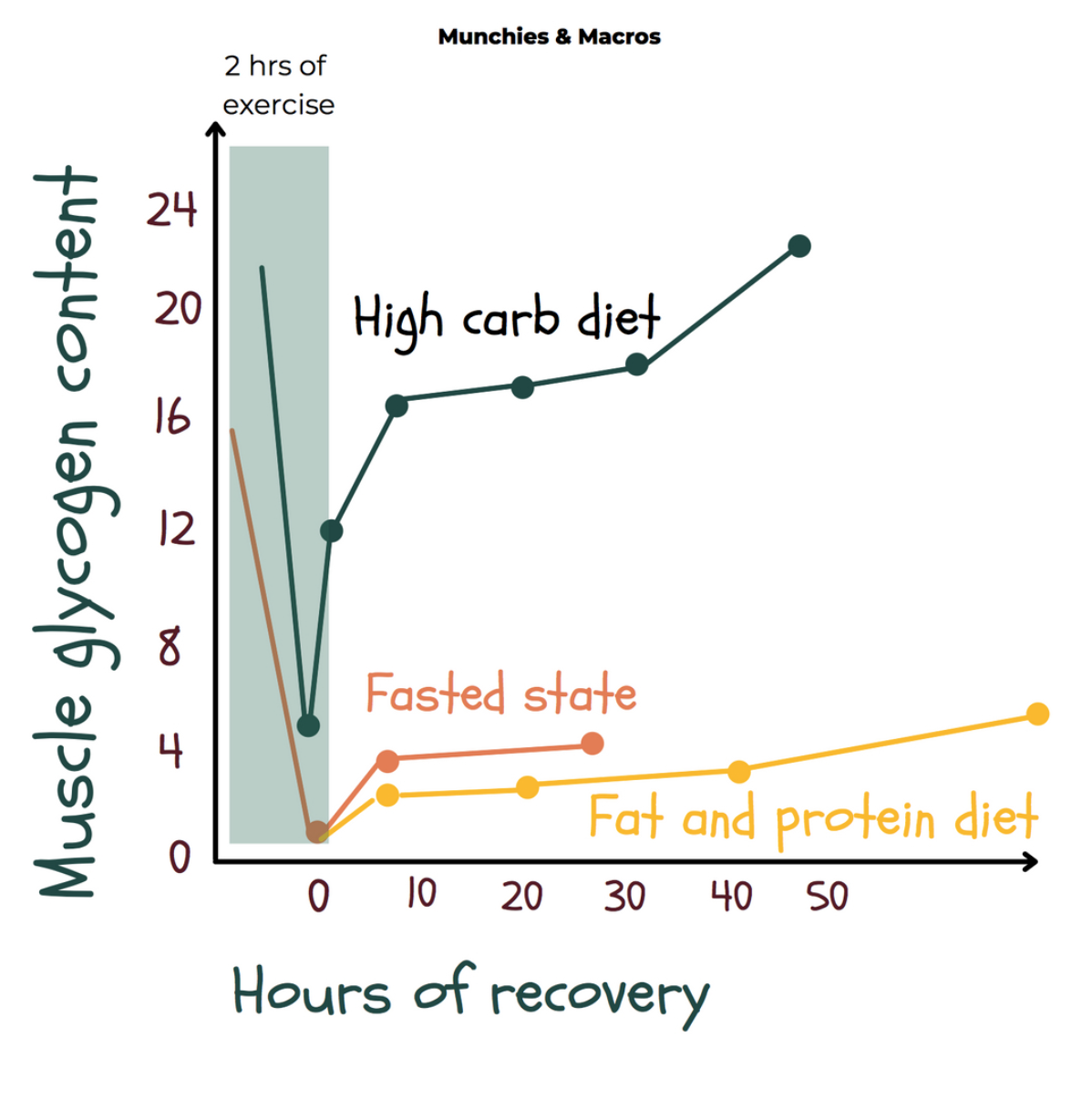Is a high fat/low carb diet beneficial to endurance training?
As athletes we look to focus on our performance and our body composition, since the latter can affect how efficiently we move and how well we recover.
This blog will discuss whether a low carb diet for endurance athletes can be beneficial to both their performance and body composition.
It has been well documented that high carb diet increases performance and helps athletes recover better (Burke et al. 2011) however over the past few years there have been a rise in athletes training on a low carb state in hope of increasing fat oxidation.
Is this effective, beneficial and worth doing?
Let’s look some of the evidence.
Although overall energy consumption is important in maintaining stamina; specifically, when it comes to speed, power and performing at high capacity, consuming the right macronutrients at the right time is equally important.
Wanna learn more about specific macronutrients for specific movements? Read this blog here about why macronutrients matter for sports performance.
The idea that a low carb diet increases fat oxidation and spares muscle glycogen is a little misunderstood.
Training on a low carb diet whilst pushing your body through tough workouts and doing so consistently can result in increased post exercise immunosuppression - meaning your immune system could dip causing you to get sick easily - and if you’re an athlete, that is not a place you want to be in.
Here’s what can also happen if you continuously train on a high fat/low carb state:
decrease overall ability to use muscle glycogen
decrease chronic adaptations to exercise
decrease an athlete’s ability to perform at high level
Our bodies are designed to power on glucose, so even if you starved yourself from all the carbs in the world and went on a high fat diet like Keto for example, your body would still find a way to create glucose through a process called gluconeogenesis.
So ultimately, while we can still exercise and survive day to day on a low carb diet, it’s not the body’s preferred way of doing things.
There is no evidence to suggest that a high fat diet is beneficial to athletes.
It has been found that not only is there no benefit to training on a low carb/high fat diet, practicing this for a week can lead to an impaired performance due to “increased endogenous carbohydrate stores” (Ormsbee et al 2014).
Athletes in the research found that for the same power output, they felt like they had to work harder and experienced more fatigue and an increase in RPE (rate of perceived exertion), in other words, they felt like they had to push harder.
This has been such a topic of interest that researchers have tried to find ways to offset the affects of a low carb diet by replacing caffeine.
There have been various studies that have shown that a low carb diet can be offset by a high intake of caffeine.
To help you manage exercise fatigue, try increasing your pre workout caffeine.
This won’t “fix” the issue of being low on glycogen but just something to bear in mind if you’re ever training without adequate carbohydrates.
Training on a low carb state has been show to decrease performance by up to 8% however, by adding up to 3-6 milligrams per kg of body weight of caffeine to your pre-workout, you can counter the affects of the low carb diet by up to 2.8%-3.5% (Lane et al. 2013).
This however, won’t be enough to sustain your energy levels over a long period of training and shouldn’t be done habitually especially if performance and health is the ultimate goal.
Here’s another fun fact about caffeine: It increases fat oxidation.
So if you want to increase your fat oxidation you don’t have to cut out carbs, just increase your caffeine intake in the peri-workout window and you’ll get the same effects.
Conclusion
There is still little evidence to suggest that a high fat/low carb diet is beneficial to athletes. In addition to that, research has also found that a high fat diet as opposed to a high carb diet, increases your RPE.
This can obviously lead to a lower intensity and volume of training. Simply put, a low carb diet causes exercise fatigue. Again, not what you want as a high performing athlete.
Do you follow a high fat and low carb diet? Is it working for you? Comment below.
Citations
Lane SC, Areta JL, Bird SR, Coffey VG, Burke LM, Desbrow B, Karagounis LG, Hawley JA. Caffeine ingestion and cycling power output in a low or normal muscle glycogen state. Med Sci Sports Exerc. 2013 Aug;45(8):1577-84. doi: 10.1249/MSS.0b013e31828af183. PMID: 23439421.
Louise M. Burke, John A. Hawley, Stephen H. S. Wong & Asker E. Jeukendrup (2011) Carbohydrates for training and competition, Journal of Sports Sciences, 29:sup1, S17-S27, DOI: 10.1080/02640414.2011.585473
Ormsbee MJ, Bach CW, Baur DA. Pre-exercise nutrition: the role of macronutrients, modified starches and supplements on metabolism and endurance performance. Nutrients. 2014;6(5):1782-1808. Published 2014 Apr 29. doi:10.3390/nu6051782




